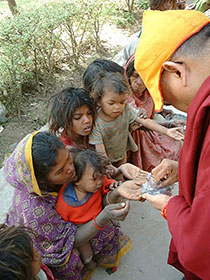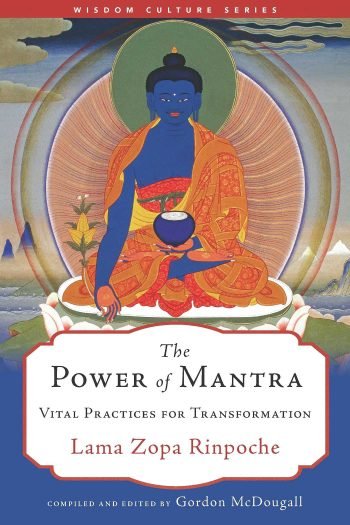- Home
- FPMT Homepage
Foundation for the Preservation of the Mahayana Tradition
The FPMT is an organization devoted to preserving and spreading Mahayana Buddhism worldwide by creating opportunities to listen, reflect, meditate, practice and actualize the unmistaken teachings of the Buddha and based on that experience spreading the Dharma to sentient beings. We provide integrated education through which people’s minds and hearts can be transformed into their highest potential for the benefit of others, inspired by an attitude of universal responsibility and service. We are committed to creating harmonious environments and helping all beings develop their full potential of infinite wisdom and compassion. Our organization is based on the Buddhist tradition of Lama Tsongkhapa of Tibet as taught to us by our founders Lama Thubten Yeshe and Lama Thubten Zopa Rinpoche.
- Willkommen
Die Stiftung zur Erhaltung der Mahayana Tradition (FPMT) ist eine Organisation, die sich weltweit für die Erhaltung und Verbreitung des Mahayana-Buddhismus einsetzt, indem sie Möglichkeiten schafft, den makellosen Lehren des Buddha zuzuhören, über sie zur reflektieren und zu meditieren und auf der Grundlage dieser Erfahrung das Dharma unter den Lebewesen zu verbreiten.
Wir bieten integrierte Schulungswege an, durch denen der Geist und das Herz der Menschen in ihr höchstes Potential verwandelt werden zum Wohl der anderen – inspiriert durch eine Haltung der universellen Verantwortung und dem Wunsch zu dienen. Wir haben uns verpflichtet, harmonische Umgebungen zu schaffen und allen Wesen zu helfen, ihr volles Potenzial unendlicher Weisheit und grenzenlosen Mitgefühls zu verwirklichen.
Unsere Organisation basiert auf der buddhistischen Tradition von Lama Tsongkhapa von Tibet, so wie sie uns von unseren Gründern Lama Thubten Yeshe und Lama Thubten Zopa Rinpoche gelehrt wird.
- Bienvenidos
La Fundación para la preservación de la tradición Mahayana (FPMT) es una organización que se dedica a preservar y difundir el budismo Mahayana en todo el mundo, creando oportunidades para escuchar, reflexionar, meditar, practicar y actualizar las enseñanzas inconfundibles de Buda y en base a esa experiencia difundir el Dharma a los seres.
Proporcionamos una educación integrada a través de la cual las mentes y los corazones de las personas se pueden transformar en su mayor potencial para el beneficio de los demás, inspirados por una actitud de responsabilidad y servicio universales. Estamos comprometidos a crear ambientes armoniosos y ayudar a todos los seres a desarrollar todo su potencial de infinita sabiduría y compasión.
Nuestra organización se basa en la tradición budista de Lama Tsongkhapa del Tíbet como nos lo enseñaron nuestros fundadores Lama Thubten Yeshe y Lama Zopa Rinpoche.
A continuación puede ver una lista de los centros y sus páginas web en su lengua preferida.
- Bienvenue
L’organisation de la FPMT a pour vocation la préservation et la diffusion du bouddhisme du mahayana dans le monde entier. Elle offre l’opportunité d’écouter, de réfléchir, de méditer, de pratiquer et de réaliser les enseignements excellents du Bouddha, pour ensuite transmettre le Dharma à tous les êtres. Nous proposons une formation intégrée grâce à laquelle le cœur et l’esprit de chacun peuvent accomplir leur potentiel le plus élevé pour le bien d’autrui, inspirés par le sens du service et une responsabilité universelle. Nous nous engageons à créer un environnement harmonieux et à aider tous les êtres à épanouir leur potentiel illimité de compassion et de sagesse. Notre organisation s’appuie sur la tradition guéloukpa de Lama Tsongkhapa du Tibet, telle qu’elle a été enseignée par nos fondateurs Lama Thoubtèn Yéshé et Lama Zopa Rinpoché.
Visitez le site de notre Editions Mahayana pour les traductions, conseils et nouvelles du Bureau international en français.
Voici une liste de centres et de leurs sites dans votre langue préférée
- Benvenuto
L’FPMT è un organizzazione il cui scopo è preservare e diffondere il Buddhismo Mahayana nel mondo, creando occasioni di ascolto, riflessione, meditazione e pratica dei perfetti insegnamenti del Buddha, al fine di attualizzare e diffondere il Dharma fra tutti gli esseri senzienti.
Offriamo un’educazione integrata, che può trasformare la mente e i cuori delle persone nel loro massimo potenziale, per il beneficio di tutti gli esseri, ispirati da un’attitudine di responsabilità universale e di servizio.
Il nostro obiettivo è quello di creare contesti armoniosi e aiutare tutti gli esseri a sviluppare in modo completo le proprie potenzialità di infinita saggezza e compassione.
La nostra organizzazione si basa sulla tradizione buddhista di Lama Tsongkhapa del Tibet, così come ci è stata insegnata dai nostri fondatori Lama Thubten Yeshe e Lama Zopa Rinpoche.
Di seguito potete trovare un elenco dei centri e dei loro siti nella lingua da voi prescelta.
- 欢迎 / 歡迎
简体中文
“护持大乘法脉基金会”( 英文简称:FPMT。全名:Foundation for the Preservation of the Mahayana Tradition) 是一个致力于护持和弘扬大乘佛法的国际佛教组织。我们提供听闻,思维,禅修,修行和实证佛陀无误教法的机会,以便让一切众生都能够享受佛法的指引和滋润。
我们全力创造和谐融洽的环境, 为人们提供解行并重的完整佛法教育,以便启发内在的环宇悲心及责任心,并开发内心所蕴藏的巨大潜能 — 无限的智慧与悲心 — 以便利益和服务一切有情。
FPMT的创办人是图腾耶喜喇嘛和喇嘛梭巴仁波切。我们所修习的是由两位上师所教导的,西藏喀巴大师的佛法传承。
繁體中文
護持大乘法脈基金會”( 英文簡稱:FPMT。全名:Found
ation for the Preservation of the Mahayana Tradition ) 是一個致力於護持和弘揚大乘佛法的國際佛教組織。我們提供聽聞, 思維,禪修,修行和實證佛陀無誤教法的機會,以便讓一切眾生都能 夠享受佛法的指引和滋潤。 我們全力創造和諧融洽的環境,
為人們提供解行並重的完整佛法教育,以便啟發內在的環宇悲心及責 任心,並開發內心所蘊藏的巨大潛能 — 無限的智慧與悲心 – – 以便利益和服務一切有情。 FPMT的創辦人是圖騰耶喜喇嘛和喇嘛梭巴仁波切。
我們所修習的是由兩位上師所教導的,西藏喀巴大師的佛法傳承。 察看道场信息:
- FPMT Homepage
- News/Media
-
- Study & Practice
-
-
- About FPMT Education Services
- Latest News
- Programs
- New to Buddhism?
- Buddhist Mind Science: Activating Your Potential
- Heart Advice for Death and Dying
- Discovering Buddhism
- Living in the Path
- Exploring Buddhism
- FPMT Basic Program
- FPMT Masters Program
- FPMT In-Depth Meditation Training
- Maitripa College
- Lotsawa Rinchen Zangpo Translator Program
- Universal Education for Compassion & Wisdom
- Online Learning Center
-
- Prayers & Practice Materials
- Overview of Prayers & Practices
- Full Catalogue of Prayers & Practice Materials
- Explore Popular Topics
- Benefiting Animals
- Chenrezig Resources
- Death & Dying Resources
- Lama Chopa (Guru Puja)
- Lama Zopa Rinpoche: Compendium of Precious Instructions
- Lama Zopa Rinpoche: Life Practice Advice
- Lama Zopa Rinpoche Practice Series
- Lamrim Resources
- Mantras
- Prayer Book Updates
- Purification Practices
- Sutras
- Thought Transformation (Lojong)
- Audio Materials
- Dharma Dates - Tibetan Calendar
- Translation Services
- Publishing Services
- Ways to Offer Support
- Prayers & Practice Materials
-
- Teachings and Advice
- Find Teachings and Advice
- Lama Zopa Rinpoche Advice Page
- Lama Zopa Rinpoche: Compendium of Precious Instructions
- Lama Zopa Rinpoche Video Teachings
- ༧སྐྱབས་རྗེ་བཟོད་པ་རིན་པོ་ཆེ་མཆོག་ནས་སྩལ་བའི་བཀའ་སློབ་བརྙན་འཕྲིན།
- Podcasts
- Lama Yeshe Wisdom Archive
- Buddhism FAQ
- Dharma for Young People
- Resources on Holy Objects
- Teachings and Advice
-
-
*If a menu item has a submenu clicking once will expand the menu clicking twice will open the page.
-
-
- Centers
-
- Teachers
-
- Projects
-
-
-
-
*If a menu item has a submenu clicking once will expand the menu clicking twice will open the page.
-
-
- FPMT
-
-
-
-
-
In Buddhism, we are not particularly interested in the quest for intellectual knowledge alone. We are much more interested in understanding what’s happening here and now, in comprehending our present experience, what we are at this very moment, our fundamental nature.
Lama Thubten Yeshe
-
-
-
- Shop
-
-
-
The Foundation Store is FPMT’s online shop and features a vast selection of Buddhist study and practice materials written or recommended by our lineage gurus. These items include homestudy programs, prayers and practices in PDF or eBook format, materials for children, and other resources to support practitioners.
Items displayed in the shop are made available for Dharma practice and educational purposes, and never for the purpose of profiting from their sale. Please read FPMT Foundation Store Policy Regarding Dharma Items for more information.
-
-
Advice from Lama Zopa Rinpoche
27
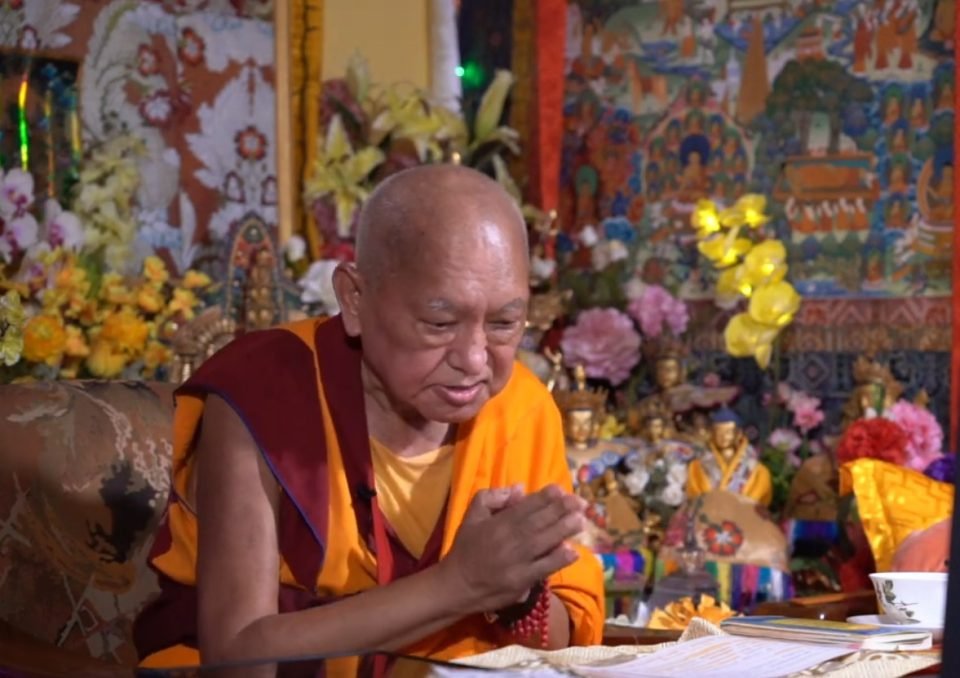
Lama Zopa Rinpoche offering Thought Transformation teachings to Russian students via Zoom from Kopan Monastery, Nepal, June 26, 2022.
Lama Zopa Rinpoche continues his video teachings on thought transformation. Here is a summary of a teaching given on June 26 from Kopan Monastery, Nepal, at the request of Telo Tulku Rinpoche, Ganden Tendar Ling FPMT Buddhist Center, Aryadeva FPMT Study Group, and the Save Tibet Foundation in Russia.
The first kindness of sentient beings is that they are the source of all past, present, and future happiness including enlightenment, Lama Zopa Rinpoche reminds us. They are from whom we receive Buddha, Dharma, and Sangha and in whom we take refuge. A buddha comes from a bodhisattva. A bodhisattva comes from bodhichitta, and bodhichitta comes from great compassion. Great compassion comes from all those sentient beings whose minds are obscured and suffering including every hell being, every hungry ghost, every animal, every human being, every sura, and every asura being.
Before you practice thought transformation, you have to understand that sentient beings are so precious and we must stop harming others. If we remember the kindness of sentient beings, naturally we will respect them and the mind will be less depressed.
Rinpoche discusses “the second kindness,” the kindness of sentient beings when they were our human mother (55:30). Rinpoche offers commentary on several points related to this, including: All sentient beings have been your mother; your mother gave you a human body; your mother protected you from hundreds of dangers every day; your mother bore hardships for you; your mother educated you in the ways of the world; and your mother created much negative karma for you.
The “third kindness” is that our shelter, food, and clothing came from the kindness of sentient beings (1:13:47).
Sentient beings are like a guru, Rinpoche explains. They are wish-granting jewels more precious than gold, diamonds, or sapphires. Cherishing even one sentient being brings us to enlightenment. In fact, the happiness of all sentient beings is in our hands.
We invite you to go deeper into the topics presented here, plus many others, by watching Rinpoche’s video and reading the full transcript of Rinpoche’s teaching.
- Read the transcript of Rinpoche’s teaching
- Find Rinpoche’s Teachings on Thought Transformation translated into various languages.
- Dedication verses
Summary of Lama Zopa Rinpoche’s teaching by Carina Rumrill based on the transcript by Ven. Joan Nicell with editorial input and additions by Justin Jenkins. This summary is meant to highlight key topics presented by Rinpoche in the recorded video and is not intended to serve as a full representation of Rinpoche’s teaching, which is best received through watching the video and/or reading the full transcript.
Watch more from the video series Lama Zopa Rinpoche’s Teachings on Thought Transformation and find links to videos in transcripts, MP3s, additional practice advice, and more:
https://fpmt.org/fpmt/announcements/resources-for-coronavirus-pandemic/advice-from-lama-zopa-rinpoche-for-coronavirus/
You can listen to this teaching on our full-length-teachings podcast as well:
https://fpmt.org/media/podcasts/
Lama Zopa Rinpoche is the spiritual director of the Foundation for the Preservation of Mahayana Tradition (FPMT), a Tibetan Buddhist organization dedicated to the transmission of the Mahayana Buddhist tradition and values worldwide through teaching, meditation and community service.
- Tagged: advice from lama zopa rinpoche, coronavirus, lama zopa rinpoche thought transformation video teaching, video
26
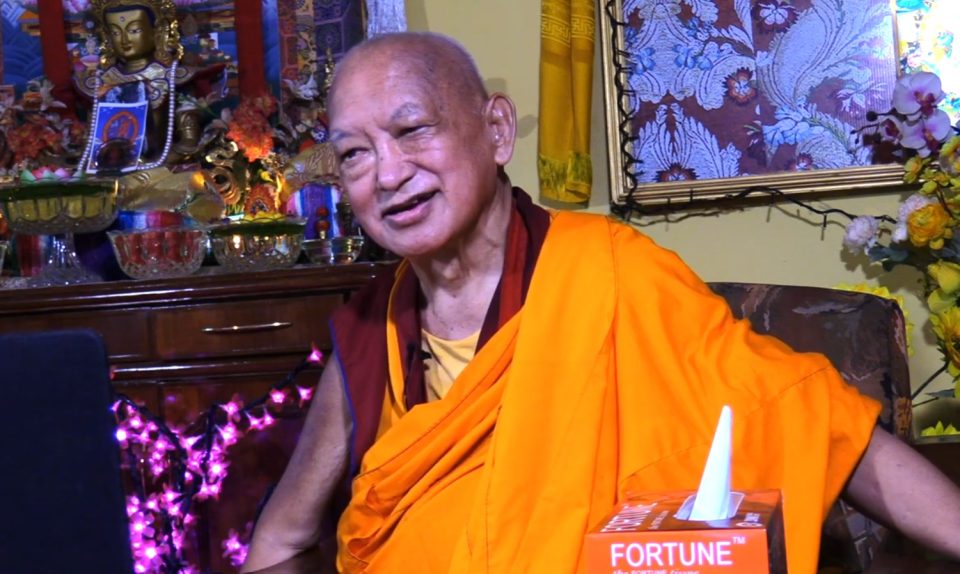
Lama Zopa Rinpoche offering Thought Transformation teachings to Russian students via Zoom from Kopan Monastery, Nepal, on June 25, 2022.
Lama Zopa Rinpoche continues his video teachings on thought transformation. Here is a summary of a teaching given on June 25 from Kopan Monastery, Nepal, at the request of Telo Tulku Rinpoche, Ganden Tendar Ling FPMT Buddhist Center, Aryadeva FPMT Study Group, and the Save Tibet Foundation in Russia.
The foundation of thought transformation is to stop harming others, Rinpoche explains. When anything undesirable happens to us, we believe it came from outside, we never relate it to our own mind. If we didn’t harm others in the past, nobody could harm us in the present time. If we are harmed by people or animals, anger arises and we want to harm them back, we view them as an enemy. If we really want to stop experiencing harm, we have to learn and understand karma, we have to stop harming others.
Happiness and suffering in life depends on how we think. If we want less problems in life, then we must look at the situation as positive and healthy. The more we can look at things as positive, the less angry we will be. Then life isn’t destroyed by anger, our liberation from samsara isn’t destroyed by anger, our enlightenment isn’t destroyed by anger. The more we can look at miserable or bad conditions as positive, the more patience and good heart develops, the more compassion toward others we have. Thought transformation means we look at bad conditions as positive.
When we practice Dharma, we take care of the world. If we think in a positive way, there is peace for oneself and peace for others—we can bring peace to the world and in our family by practicing Dharma. Practicing Dharma means taking care of the mind and benefiting others. Happiness follows a good heart and suffering follows a bad heart. With a good heart, when we speak to someone or undertake any activity—it becomes virtue, the result is only happiness. This is why it is very important, in any action of body, speech, and mind in daily life, before we start, generate a good heart, a Dharma mind. Then every action becomes Dharma.
We invite you to go deeper into the topics presented here, plus many others, by watching Rinpoche’s video and reading the full transcript of Rinpoche’s teaching.
- Read the transcript of Rinpoche’s teaching
- Find Rinpoche’s Teachings on Thought Transformation translated into various languages.
- Dedication verses
Summary of Lama Zopa Rinpoche’s teaching by Carina Rumrill based on the transcript by Ven. Joan Nicell with editorial input and additions by Justin Jenkins. This summary is meant to highlight key topics presented by Rinpoche in the recorded video and is not intended to serve as a full representation of Rinpoche’s teaching, which is best received through watching the video and/or reading the full transcript.
Watch more from the video series Lama Zopa Rinpoche’s Teachings on Thought Transformation and find links to videos in transcripts, MP3s, additional practice advice, and more:
https://fpmt.org/fpmt/announcements/resources-for-coronavirus-pandemic/advice-from-lama-zopa-rinpoche-for-coronavirus/
You can listen to this teaching on our full-length-teachings podcast as well:
https://fpmt.org/media/podcasts/
Lama Zopa Rinpoche is the spiritual director of the Foundation for the Preservation of Mahayana Tradition (FPMT), a Tibetan Buddhist organization dedicated to the transmission of the Mahayana Buddhist tradition and values worldwide through teaching, meditation and community service.
- Tagged: advice from lama zopa rinpoche, coronavirus, lama zopa rinpoche thought transformation video teaching, thought transformation, video
21
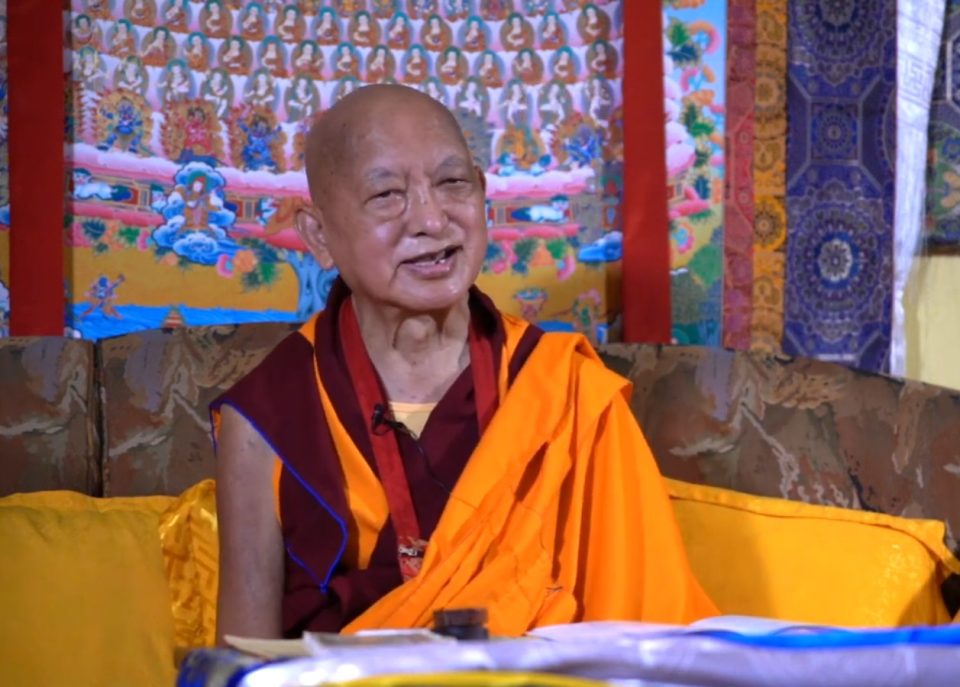
Lama Zopa Rinpoche giving “Your Main Practice in Life Should Be Cherishing Others” teaching on June 13, 2022 from Kopan Monastery.
Lama Zopa Rinpoche continues his video teachings on thought transformation from Kopan Monastery in Nepal. Here is a summary of a teaching he offered to students from China and Malaysia via Zoom on June 13:
All of the 84,000 teachings of Buddha are included in the advice to not harm sentient beings and to benefit them, Rinpoche explains. If we harm sentient beings, we can’t benefit them. All of the suffering we experience ourselves, as well as the suffering we cause others to experience, is caused by our self-cherishing thought. Our worst enemy is our self-cherishing thought. From Shantideva’s Bodhicharyavatara (v. 8.120):
If you want to quickly guide
Yourself and others,
Secretly practice
Exchanging yourself and others.
The conclusion, Rinpoche explains, is that the solution to our problems is bodhichitta. Our main practice in life should be bodhichitta, cherishing others. Without giving up the I, we cannot abandon suffering. The less self-cherishing and the more we cultivate the good heart, the less problems we have.
Rinpoche discusses the kindness of mother sentient beings, and also the kindness of those who are not your mother starting at (1:07:28) in the video, and on page 17 of the transcript.
In preparation for offering the refuge ceremony, Rinpoche discusses four of the five lay vows which one can take in addition to refuge. One can take refuge alone or any/all of the following vows in addition: the vow to abandon killing (1:16:57), the vow to abandon sexual misconduct (1:19:43), the vow to abandon stealing (1:20:27), the vow to abandon lying (Rinpoche did not discuss this vow in this teaching), the vow to abandon alcohol (1:21:37).
Rinpoche offers the refuge ceremony at (1:24:48).
Rinpoche offered an eleven-part series of teachings on refuge in the thought transformation series starting at video 116 on September 26, 2021, and ending with video 126 on June 13, 2022.
We invite you to go deeper into the topics presented here, plus many others, by watching Rinpoche’s video and reading the full transcript of Rinpoche’s teaching.
Watch Lama Zopa Rinpoche’s teaching “Your Main Practice in Life Should Be Cherishing Others”:
- Read the transcript of Rinpoche’s teaching
- Find Rinpoche’s Teachings on Thought Transformation translated into various languages.
- The Foundation Store offers many resources for your practice of refuge.
- Dedication verses
Summary of Lama Zopa Rinpoche’s teaching by Carina Rumrill based on the transcript by Ven. Joan Nicell with editorial input and additions by Justin Jenkins. This summary is meant to highlight key topics presented by Rinpoche in the recorded video and is not intended to serve as a full representation of Rinpoche’s teaching, which is best received through watching the video and/or reading the full transcript.
Watch more from the video series Lama Zopa Rinpoche’s Teachings on Thought Transformation and find links to videos in transcripts, MP3s, additional practice advice, and more:
https://fpmt.org/fpmt/announcements/resources-for-coronavirus-pandemic/advice-from-lama-zopa-rinpoche-for-coronavirus/
You can listen to this teaching on our full-length-teachings podcast as well:
https://fpmt.org/media/podcasts/
Lama Zopa Rinpoche is the spiritual director of the Foundation for the Preservation of Mahayana Tradition (FPMT), a Tibetan Buddhist organization dedicated to the transmission of the Mahayana Buddhist tradition and values worldwide through teaching, meditation and community service.
- Tagged: advice from lama zopa rinpoche, coronavirus, lama zopa rinpoche thought transformation video teaching, refuge, video
19
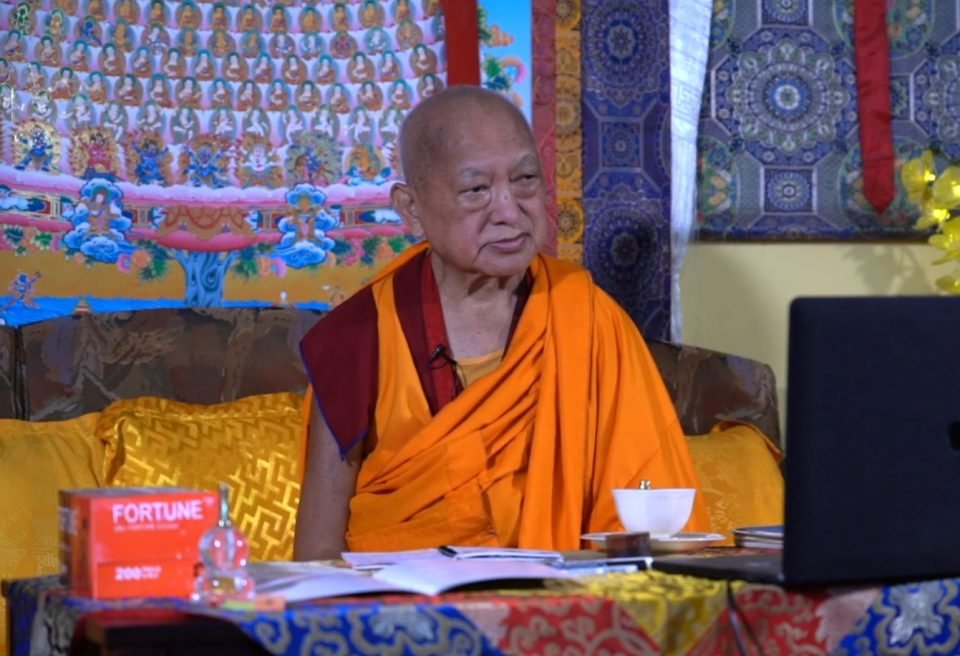
Lama Zopa Rinpoche giving “The Real Refuge Practice is Cherishing Sentient Beings” teaching on June 12, 2022 from Kopan Monastery.
Lama Zopa Rinpoche continues his video teachings on thought transformation from Kopan Monastery in Nepal. Here is a summary of a teaching he offered to students from China and Malaysia via Zoom on June 12:
By taking refuge in the Dharma, we should stop harming sentient beings, Rinpoche reminds us. And more than that, we should benefit them. In fact, the real refuge practice is cherishing sentient beings. If we take care of them the most, if we cherish them the most, that is the best offering to all the Buddhas, Dharma, and Sangha. To show respect for everyone is the best practice.
There are many ways to benefit others, including animals. For example, we can help the animals in meat shops by praying for them. Rinpoche shares that he prays in this way when he passes meat shops, “Due to all the past, present, and future merits collected by me and all the three-time merits collected by numberless sentient beings, and the three-time merits collected by numberless buddhas, may all these animals that were killed in all the past days and in the future—as well as the people and the butchers who participated—may they never get reborn in the lower realms again. May they be born in a pure land where they can be enlightened immediately. Or, may they receive a perfect human body, meet the Mahayana teachings, meet a perfectly qualified Mahayana guru revealing the unmistaken path to enlightenment, and by pleasing that guru, may they achieve enlightenment. By seeing that guru as a buddha, may they achieve enlightenment.”
We can also explain to others that if they stop harming animals they will receive happiness. Of course, they may get angry and this depends on an individual’s skill, but this is one way to help others. It’s one of the little things we can do for others.
Sentient beings are so precious because the Buddha, Dharma, and Sangha came from them. Even those who we call enemy, who get angry with us, who harm us with their body, speech, and mind. These people are unbelievably precious because Buddha, Dharma, and Sangha come from them as well. The more we realize the kindness of sentient beings, the more we will dedicate our life to them.
Throughout this teaching, Rinpoche also continues to discuss what to abandon and what to practice after having taken refuge in the Sangha at (17:49 – 44:17 ) in the video, and on pages 4-10 in the transcript.
We invite you to go deeper into the topics presented here, plus many others, by watching Rinpoche’s video and reading the full transcript of Rinpoche’s teaching.
Watch Lama Zopa Rinpoche’s teaching “The Real Refuge Practice Is Cherishing Sentient Beings”:
- Read the transcript of Rinpoche’s teaching
- Find Rinpoche’s Teachings on Thought Transformation translated into various languages.
- Dedication verses
Summary of Lama Zopa Rinpoche’s teaching by Carina Rumrill based on the transcript by Ven. Joan Nicell with editorial input and additions by Justin Jenkins. This summary is meant to highlight key topics presented by Rinpoche in the recorded video and is not intended to serve as a full representation of Rinpoche’s teaching, which is best received through watching the video and/or reading the full transcript.
Watch more from the video series Lama Zopa Rinpoche’s Teachings on Thought Transformation and find links to videos in transcripts, MP3s, additional practice advice, and more:
https://fpmt.org/fpmt/announcements/resources-for-coronavirus-pandemic/advice-from-lama-zopa-rinpoche-for-coronavirus/
Lama Zopa Rinpoche is the spiritual director of the Foundation for the Preservation of Mahayana Tradition (FPMT), a Tibetan Buddhist organization dedicated to the transmission of the Mahayana Buddhist tradition and values worldwide through teaching, meditation and community service.
- Tagged: advice from lama zopa rinpoche, coronavirus, lama zopa rinpoche thought transformation video teaching, refuge, video
13
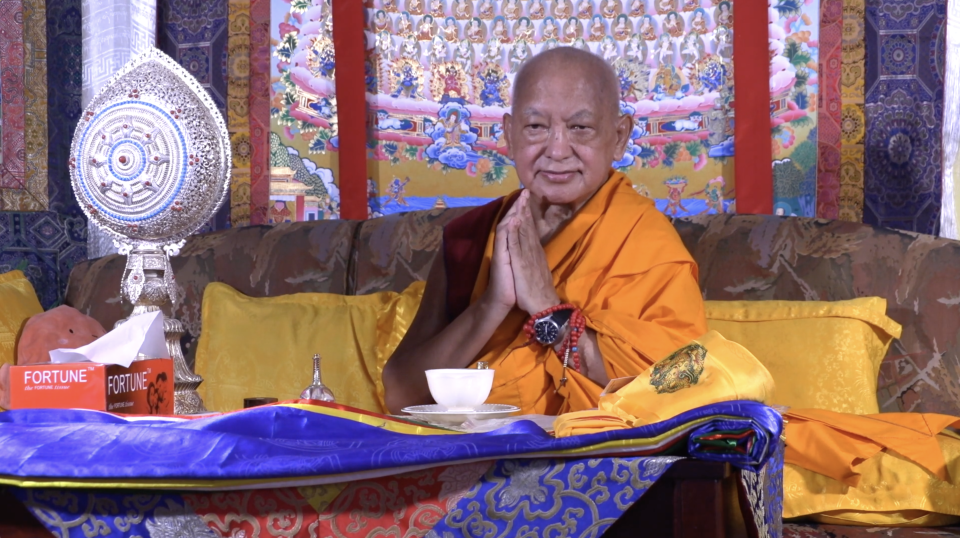
Lama Zopa Rinpoche during the thought transformation teaching, “Having Taken Refuge, What to Abandon and What to Practice,” Kopan Monastery, June 11, 2022.
Lama Zopa Rinpoche continues his video teachings on thought transformation from Kopan Monastery in Nepal. Here is a summary of Rinpoche’s June 11, 2022 teaching which he offered via Zoom to students in China and Malaysia:
Numberless buddhas of the past, present, and future can see our suffering and that we need happiness, Rinpoche explains. They want to help, they want to guide us. However, from our side, if we don’t rely on them by going for refuge, all of their power together cannot guard us, cannot save us, cannot keep us from the lower realms. Therefore, take refuge in Buddha, Dharma, and Sangha so we don’t cheat ourselves. The reason why we have been suffering in samsara from beginningless rebirths is because we haven’t followed the Guru, Buddha, Dharma, and Sangha.
Every happiness and suffering we experience came from the mind, from karma. Therefore, examine one’s body, speech and mind and attempt to abandon negative karma and practice virtue, Rinpoche urges us. We should engage in ethical, healthy, virtuous, positive, and beneficial things which bring happiness to ourselves and to all sentient beings. Just as one protects themselves by following their parents’ good advice, we must protect ourselves by following the Dharma.
The purpose of this life is to not only abstain from harming others, but to cause them happiness. Everyone—from small insects to human beings—wants happiness and not suffering. Benefiting others makes life important.
Rinpoche explains that there is an absolute buddha and a conventional buddha. The absolute buddha is the holy body of the dharmakaya, the omniscient mind, and the ultimate nature of the omniscient mind. The conventional buddha is the buddha which is a truth for the all-obscuring mind—that is the nirmanakaya aspect.
There is an absolute Dharma and a conventional Dharma. The wisdom directly perceiving emptiness is the absolute Dharma. The subjects, the texts, the lamrim—that is the conventional Dharma.
There is the absolute sangha and the conventional sangha. The absolute sangha is the sangha who has a realization directly perceiving emptiness. The conventional sangha has to be four members; even if they don’t have the wisdom directly perceiving emptiness, but are living in 253 pure vows purely—that is the conventional sangha.
Rinpoche discusses what to abandon and what to practice after having taken refuge in Buddha, Dharma, and Sangha at (38:32) in the video and starting on page 10 in the transcript. We recommend listening to this part of the teaching and following along in the transcript, as Rinpoche goes into detail on these points.
Rinpoche also discusses that merit is multiplied 100 million times on special Buddha multiplying days and what to do and how to think when burning holy Dharma to avoid creating negative karma.
We invite you to go deeper into the topics presented here, plus many others, by watching Rinpoche’s video and reading the full transcript of Rinpoche’s teaching.
Watch Lama Zopa Rinpoche’s teaching “Having Taken Refuge What to Abandon and What to Practice “:
- Read the transcript of Rinpoche’s teaching
- Rinpoche is offering commentary on passages that can be found in the practice booklet, Refuge in the Three Jewels
- Find Rinpoche’s Teachings on Thought Transformation translated into various languages.
- Dedication verses
Summary of Lama Zopa Rinpoche’s teaching by Carina Rumrill based on the transcript by Ven. Joan Nicell with editorial input and additions by Francois Lecointre. This summary is meant to highlight key topics presented by Rinpoche in the recorded video and is not intended to serve as a full representation of Rinpoche’s teaching, which is best received through watching the video and/or reading the full transcript.
Watch more from the video series Lama Zopa Rinpoche’s Teachings on Thought Transformation and find links to videos in transcripts, MP3s, additional practice advice, and more:
https://fpmt.org/fpmt/announcements/resources-for-coronavirus-pandemic/advice-from-lama-zopa-rinpoche-for-coronavirus/
Lama Zopa Rinpoche is the spiritual director of the Foundation for the Preservation of Mahayana Tradition (FPMT), a Tibetan Buddhist organization dedicated to the transmission of the Mahayana Buddhist tradition and values worldwide through teaching, meditation and community service.
- Tagged: advice from lama zopa rinpoche, coronavirus, lama zopa rinpoche thought transformation video teaching, refuge, video
23
All About Vajrasattva
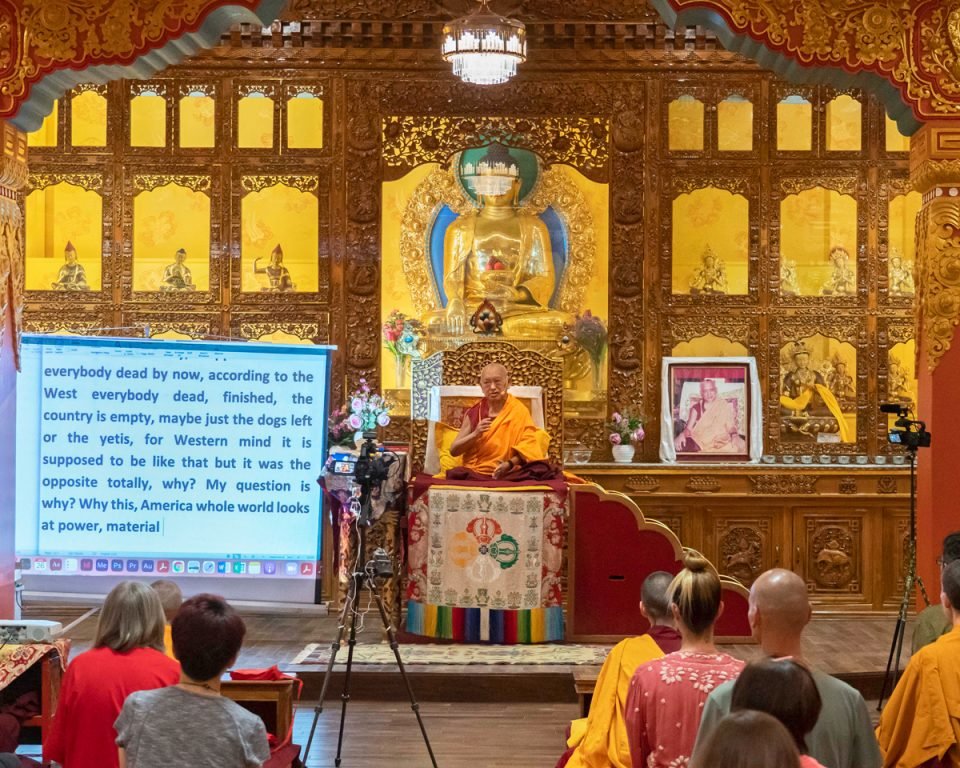
Lama Zopa Rinpoche giving a teaching to the participants of the three-month Vajrasattva retreat at Kopan Monastery, Nepal, April 2022. Photo by Ven. Lobsang Sherab.
Lama Zopa Rinpoche gave this teaching to students attending the three-month Vajrasattva retreat at Kopan Monastery in Nepal on April 28, 2022. Here’s a summary of Rinpoche’s teaching. You can find the video of the teaching and a link to the transcript below.
Whether you believe in karma or not, your negative karma increases without purification. It doesn’t matter if you are a believer or a nonbeliever. Rinpoche gives the example of a doctor saying you have cancer, but you believe you don’t have cancer. Does that help? Does this mean you don’t have cancer? Without purification, karma continues to increase until it becomes like a mountain. Without practicing Vajrasattva, a small negative karma increases day by day, week by week, month by month, year by year. Each time you do the Vajrasattva practice, your mind becomes clean. However, even though you can purify negative karma, by committing mistakes again and again, your realizations become postponed. You can continue to make mistakes and purify through Vajrasattva, but what happens is that it becomes harder and harder to have realizations on the path; your progress is postponed. This is important to remember.
The greatest purification one can do is to please the guru’s holy mind by fulfilling their wishes and advice. This is also the greatest way of collecting extensive merits and the quickest way to achieve enlightenment.
Rinpoche discusses the Four Opponent Powers, which is essential to Vajrasattva practice (starting at 1:12:14 in the video):
- The Power of Reliance
- The Power of Reflecting on the Shortcomings of Negative Karma (the Power of Regret)
- The Power of Always Engaging in the Remedy
- The Power of Not Committing the Negative Karma (Faults) Again
Reciting the Vajrasattva mantra pleases your karmically connected deity and purifies negative karma and stops it from increasing.
There is the hundred syllable mantra, which is recited twenty-one times. But if we can’t recite that, there is: OM VAJRASATTVA HUM, which is recited twenty-eight times.
Rinpoche then discusses the meanings of both mantras and offers instruction for the visualizations and meditations to be done when reciting the mantras (starting at 1:24:48 in the video).
By practicing Vajrasattva, we can purify the five heavy negative karmas without break which cause us to be reborn in hell; and we can achieve the general and sublime realizations. This is why Rinpoche stresses that Vajrasattva practice is so important.
We invite you to go deeper into the topics presented here, plus many others, by watching Rinpoche’s video or reading the full transcript of Rinpoche’s teaching.
Watch Lama Zopa Rinpoche’s teaching “All About Vajrasattva”:
Lama Zopa Rinpoche gave four teachings to students attending the 2022 Vajrasattva retreat: an introductory teaching on March 30 and three subsequent teachings on April 26–28, 2022. You can find all the videos and a combined transcript on our page “Teachings for 2022 Vajrasattva Retreatants at Kopan Monastery.”
Find links to resources to support your Vajrasattva practice in the Foundation Store.
This summary of Lama Zopa Rinpoche’s teaching is by Carina Rumrill, based on the live transcript by Ven. Joan Nicell and checked by Laura Haughey, with editorial input and additions by Laura Miller. This summary is meant to highlight key topics presented by Rinpoche in the recorded video and is not intended to serve as a full representation of Rinpoche’s teaching, which is best received through watching the video and/or reading the full transcript.
Lama Zopa Rinpoche is the spiritual director of the Foundation for the Preservation of Mahayana Tradition (FPMT), a Tibetan Buddhist organization dedicated to the transmission of the Mahayana Buddhist tradition and values worldwide through teaching, meditation and community service.
- Tagged: advice from lama zopa rinpoche, vajrasattva, video
21
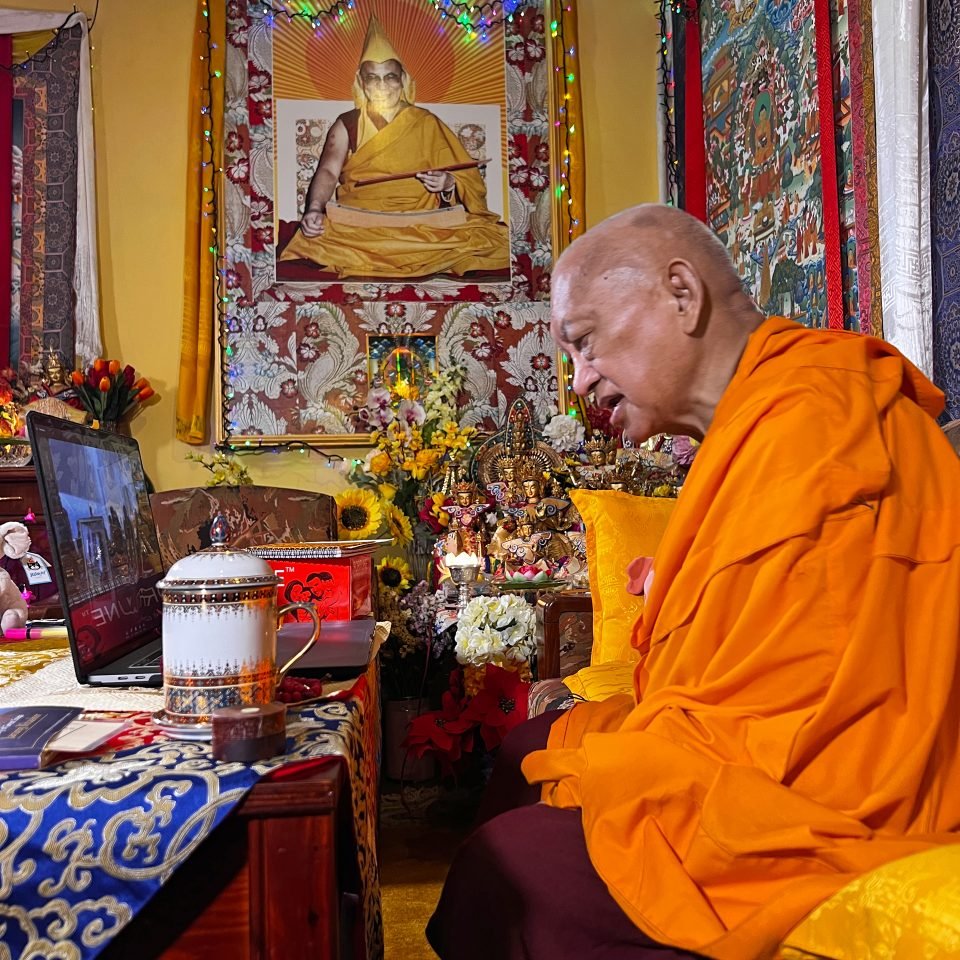
Lama Zopa Rinpoche teaching via Zoom to students in Israel, Kopan Monastery, Nepal, June 2020. Photo by Ven. Roger Kunsang.
Lama Zopa Rinpoche gave a teaching over Zoom about Buddhist refuge for the graduation ceremony of the first cohort of Human Spirit, an Israel-based Buddhist-psychoanalytic training program. Here’s a summary of Rinpoche’s teaching, which was offered on June 8, 2022, from Kopan Monastery in Nepal. You can find the video of the teaching and a link to the transcript below.
All happiness and suffering come from the mind, not from the outside, Rinpoche reminds us. Since we want happiness and don’t want suffering, the vast subject of the mind should be of utmost importance for us to investigate. To become healthy—both physically and mentally—we practice meditation, study the Dharma, and learn about the mind in order to clean it up. A negative and unhealthy mind brings sickness and suffering in so many forms. By continuing with effort to clean up the mind, going deeper and deeper through meditation and analysis, you can completely cease delusions and karma and remove the cause of suffering.
By realizing the ultimate nature of the mind—the ultimate nature of I—then we can develop wisdom and realize emptiness. This is ultimate Dharma. The real refuge is ultimate Dharma. This is like taking medicine; it ceases the cause of suffering, delusions, and karma. Since Buddha revealed the path, in the analogy of medicine, Buddha is the doctor. You take refuge in the Buddha when you take refuge in the Dharma, the teachings of the Buddha. And the Sangha are those who help you actualize the absolute Dharma and understand conventional Dharma through the scriptures. So this is why we take refuge in the Sangha.
Anger makes us very frightening and ugly, and causes us to want to harm others. So much negative karma of the body, speech, and mind are created when we view others as the enemy. This is why the benefits of practicing patience are unbelievable. By completing the perfection of patience, it is impossible for anger to arise. All the gross and subtle obscurations are ceased, purified. Then the mind becomes an enlightened mind. When the mind becomes enlightened, we can liberate the numberless sentient beings from suffering. This is the ultimate benefit to oneself and others, unlike anger which only harms self and others. When you practice patience, there is no enemy. In this way, the person who gives you an opportunity to practice patience is the most precious one in your life!
We invite you to go deeper into the topics presented here, plus many others, by watching Rinpoche’s video and reading the full transcript of Rinpoche’s teaching.
Watch Lama Zopa Rinpoche’s teaching “The Real Refuge Is Your Wisdom Realizing the Ultimate Nature”:
Read the transcript of Rinpoche’s teaching.
This summary of Lama Zopa Rinpoche’s teaching is by Carina Rumrill, based on the live transcript by Ven. Joan Nicell and checked by Laura Haughey, with editorial input and additions by Laura Miller. This summary is meant to highlight key topics presented by Rinpoche in the recorded video and is not intended to serve as a full representation of Rinpoche’s teaching, which is best received through watching the video and/or reading the full transcript.
Find resources to support your practice of refuge, including video teachings from Rinpoche as well as FPMT Education’s practice materials and programs.
You can learn more about Human Spirit in our 2016 story “Human Spirit: Bridging Buddhism and Psychoanalysis in Israel.”
Lama Zopa Rinpoche is the spiritual director of the Foundation for the Preservation of Mahayana Tradition (FPMT), a Tibetan Buddhist organization dedicated to the transmission of the Mahayana Buddhist tradition and values worldwide through teaching, meditation and community service.
- Tagged: advice from lama zopa rinpoche, refuge, video
2
There Are No Limits to the Benefits of Bodhicitta
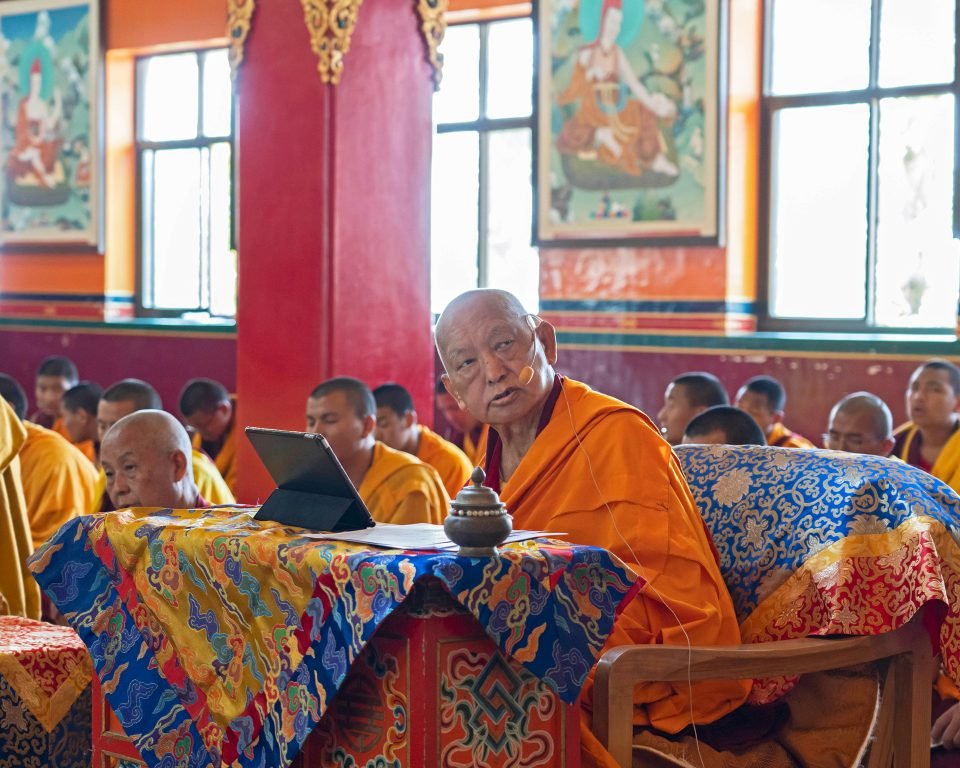
Lama Zopa Rinpoche in the Kopan Monastery gompa, Nepal, May 2022. Photo by Ven. Lobsang Sherab.
Lama Zopa Rinpoche begins this video, which was recorded in April 2018 at the Great Stupa of Universal Compassion in Bendigo, Australia, by reminding us of the benefits of making even a tiny offering to a holy object. But, Rinpoche explains, those benefits are far exceeded by the mere thought of benefiting sentient beings.
Rinpoche quotes from Lama Atisha’s Lamp of the Path to Enlightenment:
Gang gi thäl mo jar gyi te
Jang chhub tu ni sem tü na
Chhö pa di ni kyä par phag
De la tha ni ma chhi so
This is surpassed by
The offering of putting the palms together
And generating bodhicitta,
For such is limitless.
Rinpoche then mentions a quotation on bodhicitta from Shantideva’s Bodhicharyavatara:
Phän par sam pa tsam gyi kyang
Sang gyä chö lä khyä phag na
Even the mere thought to benefit someone
Surpasses making offerings to the buddhas.
Rinpoche explains how it is shown that the mere thought of benefiting a single sentient being, surpasses skies of offerings done to all the buddhas.
When our motivation is to achieve enlightenment for the numberless sentient beings, to free them from the oceans of samsaric sufferings and bring them to peerless happiness, the total cessation of obscurations and completion of realizations, this is truly incredible, because it is for all sentient beings. So this creates an unbelievable amount of merit. And it is so important to remember the benefits of bodhicitta.
Watch the video “There Are No Limits to the Benefits of Bodhicitta”:
The above video is extracted from a teaching given on April 13, 2018, at the Great Stupa of Universal Compassion in Bendigo, Australia. You can find more blogs with short video clips from Rinpoche’s teaching as well as the complete collection of these “Essential Extracts” videos on FPMT.org.
Lama Zopa Rinpoche is the spiritual director of the Foundation for the Preservation of Mahayana Tradition (FPMT), a Tibetan Buddhist organization dedicated to the transmission of the Mahayana Buddhist tradition and values worldwide through teaching, meditation and community service.
23
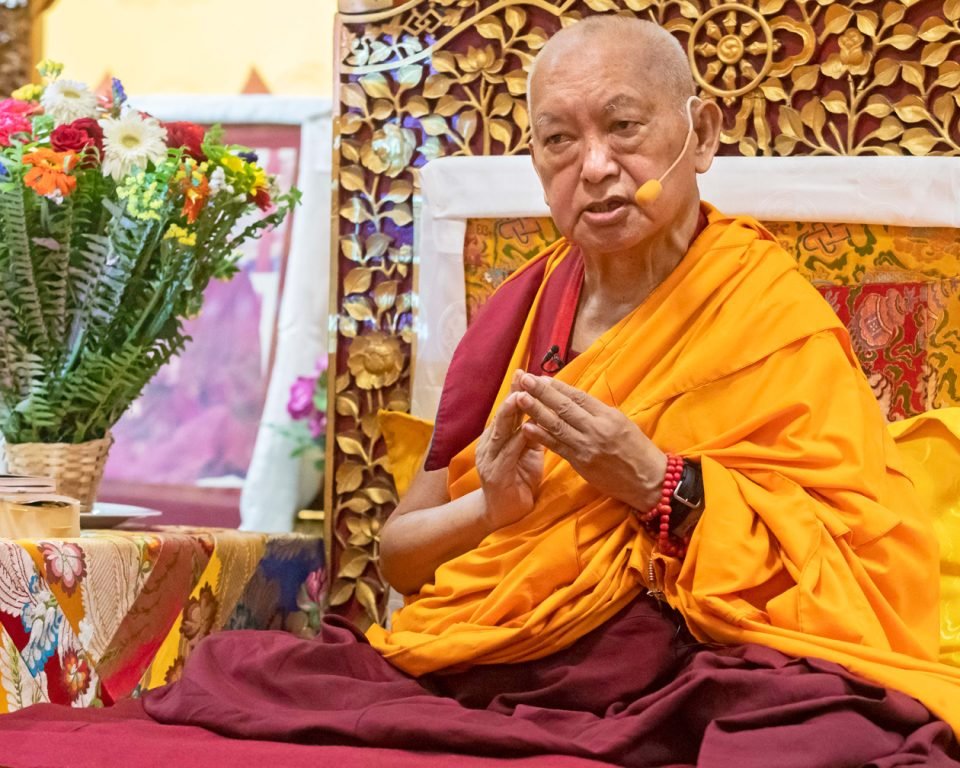
Lama Zopa Rinpoche giving a teaching to students attending the three-month Vajrasattva retreat at Kopan Monastery, Nepal, April 2022. Photo by Ven. Lobsang Sherab.
Lama Zopa Rinpoche gave this teaching to students attending the three-month Vajrasattva retreat at Kopan Monastery in Nepal on April 27, 2022. Here’s a summary of Rinpoche’s teaching. You can find the video of the teaching and a link to the transcript below.
If you want to know the truth of the world, the truth of yourself, and if you want to be free from the oceans of samsaric suffering, then you have to know the root cause of suffering, Lama Zopa Rinpoche explains. The world is full of things that are a waste of time. If you don’t know what is right or wrong, your meditation will not amount to anything, and you can waste so much of this life. You need to meet the correct teachings and that depends on merit. And you have to have faith and make correction prayers and dedications. Otherwise, it’s difficult. You could meet Buddhism but fall into eternalism or nihilism.
Rinpoche offers the retreatants a brief history of how the first month-long Kopan Course began (14:37 in the video). There have been fifty-two courses since this first course in 1971.
Generating bodhicitta when listening to the teachings is unbelievable. Even if we don’t have realizations, listening to the teachings with a bodhicitta motivation and offering them to numberless sentient beings is unbelievable. This means we listen to the teachings and dedicate to every hell being, every hungry ghost, every animal, including every ant and mosquito. So we listen to the teachings for them—not only to free them from samsara and bring them to nirvana, but for their ultimate happiness, the total cessation of obscurations and the completion of realizations.
Rinpoche leads the group in offering coffee and cake, including the Clouds of Offering Mantra (48:08 in the video).
Rinpoche continues the teaching, saying that it is so important to understand what the I is. All problems go away when we understand this, Rinpoche assures us. But when we believe in the hallucinated appearance of the I, so many problems arise. Because we don’t know the cause of happiness, due to ignorance, we destroy the cause as if it was an outside enemy. In fact, we rush to create the cause of suffering—like a fisherman who desires happiness and rushes to catch fish for money or pleasure, and due to that killing gets reborn as a fish and gets killed in future lives. Abandoning nonvirtue is the source of happiness. If we can abandon killing, for example, even a mosquito in our room, this becomes the source of happiness for us, and also so much happiness for the beings we don’t harm. In addition, the best protection from being killed is to stop killing.
Rinpoche explains the four parts of completing the action of killing (1:17:12 in the video), discusses the purification practice utilizing the four powers (1:43:19 in the video), and offers some stories of those who have committed the heavy negative karma of killing and how they purified these mistakes.
We invite you to go deeper into the topics presented here, plus many others, by watching Rinpoche’s video or reading the full transcript of Rinpoche’s teaching.
Watch Lama Zopa Rinpoche’s teaching “Abandoning Nonvirtue Is a Source of Happiness for You”:
Lama Zopa Rinpoche gave four teachings to students attending the 2022 Vajrasattva retreat: an introductory teaching on March 30 and three subsequent teachings on April 26–28. We will release the concluding teaching soon. You can find them on our page “Teachings for 2022 Vajrasattva Retreatants at Kopan Monastery.”
Find links to resources to support your Vajrasattva practice in the Foundation Store.
This summary of Lama Zopa Rinpoche’s teaching is by Carina Rumrill, based on the live transcript by Ven. Joan Nicell and checked by Laura Haughey, with editorial input and additions by Laura Miller. This summary is meant to highlight key topics presented by Rinpoche in the recorded video and is not intended to serve as a full representation of Rinpoche’s teaching, which is best received through watching the video and/or reading the full transcript.
Lama Zopa Rinpoche is the spiritual director of the Foundation for the Preservation of Mahayana Tradition (FPMT), a Tibetan Buddhist organization dedicated to the transmission of the Mahayana Buddhist tradition and values worldwide through teaching, meditation and community service.
- Tagged: advice from lama zopa rinpoche, food offering, kopan course, kopan monastery, offering, purification practice, vajrasattva, video
19
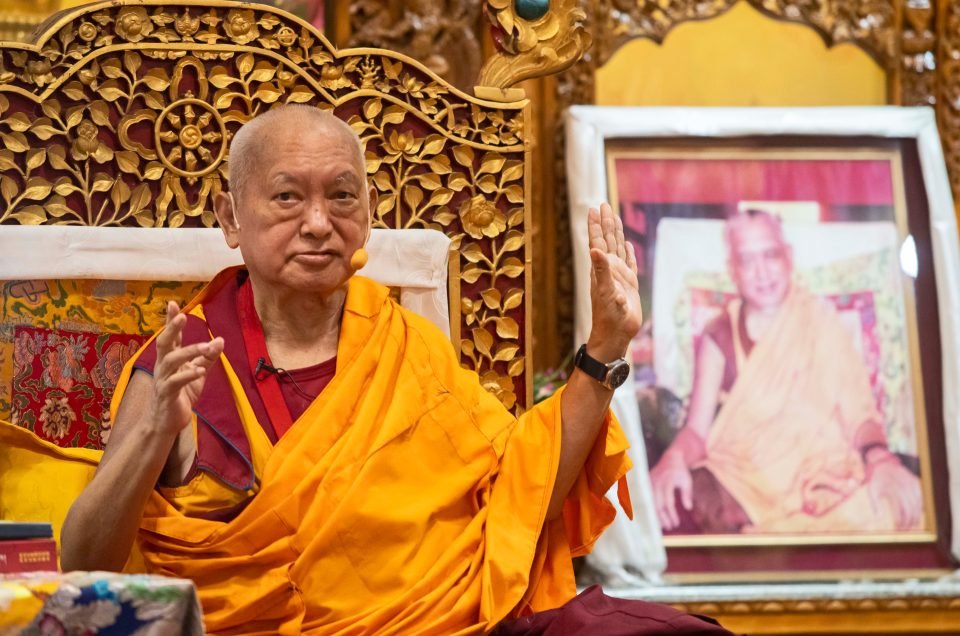
Lama Zopa Rinpoche giving a teaching to students attending the three-month Vajrasattva retreat at Kopan Monastery, Nepal, April 2022. Photo by Ven. Lobsang Sherab.
“Your coming here to do Vajrasattva, wow, that’s really what you need,” Lama Zopa Rinpoche told the students attending the three-month Vajrasattva retreat at Kopan Monastery in Nepal on April 26, 2022. Here’s a summary of Rinpoche’s teaching. You can find the video of the teaching and a link to the transcript below.
The more wealth one accumulates, the more attachment, dissatisfaction, and miserliness can develop, Rinpoche teaches. A beggar who lives every day begging for a little money is content with that. But those who have millions and billions of dollars suffer so much, and so much unhappiness arises.
There are many different levels of truth because there are so many hallucinations in life. By attending a meditation course like the Vajrasattva retreat at Kopan Monastery, one is learning about the hallucinations of life and all the levels of conventional truth. As we learn more through analytical and fixed meditation, the mind becomes happier and happier. Then, by benefiting others with a good heart—even one insect or one person—the mind has the greatest happiness, and life is so worthwhile. Practicing a good heart keeps depression away, and we can die smiling because life has been lived in service to others. If we are always angry, and follow a selfish mind, we create so much unhappiness in life and destroy the immune system, Rinpoche warns.
The Buddha’s teachings are from someone who has omniscience, perfect power, and compassion embracing every sentient being. By deciding to follow the Buddha’s teachings, one makes the most correct decision, Rinpoche says. A hallucinated I, a false I, is the root of samsara, ignorance. If we don’t like problems, we should be working to free ourselves from samsara. Therefore, we need to listen to the correct teachings from a correct guide, and then reflect and meditate, and then realizations come.
Rinpoche offers three ways to meditate on emptiness and provides commentary for each (starting at 1:38:40 in the video):
- Meditate that everything is a hallucination.
- Meditate that everything is merely imputed.
- Meditate that everything is empty.
Rinpoche then quotes Lama Tsongkhapa:
“Ignorance, which is in the nature of exaggeration, exaggerates the discrimination of good or bad. Then attachment and anger arise. Therefore, the way this [wrong concept] apprehends [objects] can also be eliminated by logic.”
Attachment and anger arise after the discrimination of good and bad. First we believe everything is truly existent, then we assign good or bad, and then attachment and anger arise. We can understand how our concepts and thoughts are wrong using this logic. And once we see that they are wrong, then we can eliminate them. In everyday life, practice seeing things as empty. Then, by actualizing emptiness, we can stop the creation of delusion and karma and become free from the suffering of samsara forever. Then, we achieve ultimate happiness, and with bodhicitta, we achieve enlightenment.
We invite you to go deeper into the topics presented here, plus many others, by watching Rinpoche’s video or reading the full transcript of Rinpoche’s teaching.
Watch Lama Zopa Rinpoche’s teaching “By Doing Vajrasattva, You Are Doing Exactly What You Need to Do”:
Lama Zopa Rinpoche gave four teachings to students attending the 2022 Vajrasattva retreat: an introductory teaching on March 30 and three subsequent teachings on April 26–28. You can find them on our page “Teachings for 2022 Vajrasattva Retreatants at Kopan Monastery.”
Find links to resources to support your Vajrasattva practice in the Foundation Store.
This summary of Lama Zopa Rinpoche’s teaching is by Carina Rumrill, based on the live transcript by Ven. Joan Nicell and checked by Laura Haughey, with editorial input and additions by Laura Miller. This summary is meant to highlight key topics presented by Rinpoche in the recorded video and is not intended to serve as a full representation of Rinpoche’s teaching, which is best received through watching the video and/or reading the full transcript.
Lama Zopa Rinpoche is the spiritual director of the Foundation for the Preservation of Mahayana Tradition (FPMT), a Tibetan Buddhist organization dedicated to the transmission of the Mahayana Buddhist tradition and values worldwide through teaching, meditation and community service.
- Tagged: advice from lama zopa rinpoche, vajrasattva, video
26
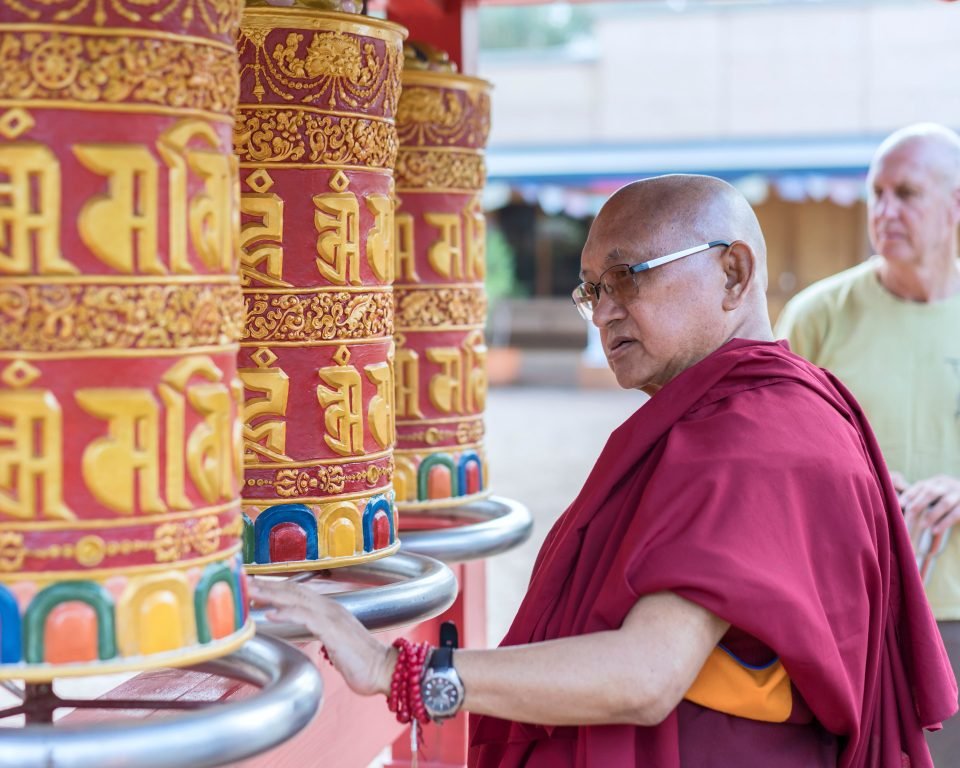
Lama Zopa Rinpoche turning prayer wheels at Atisha Centre, Bendigo, Victoria, Australia, April 2018. Photo by Ven. Lobsang Sherab.
In the new book The Power of Mantra: Vital Practices for Transformation, Lama Zopa Rinpoche guides students through understanding the power and benefit of mantras. Rinpoche explains many popular mantras, giving specific instructions for practicing them, including Shakyamuni Buddha, Chenrezig, Manjushri, Tara, Medicine Buddha, Vajrasattva, and more. In an excerpt from the chapter on Chenrezig mantra, Rinpoche discusses the importance of OM MANI PADME HUM:
Compassion is not just for those with faith in the Buddha, Dharma, and Sangha. It is not just for those who are Buddhist, for those who seek enlightenment. Everyone needs compassion. No matter what style of life we have, the compassionate life is the best life. With that, our life is totally transformed. Before it was like kaka, but now it is transformed into gold. Before there was just ego, the self-cherishing mind, but now there is compassion. Compassion brings a huge difference in our life, like the difference between the earth and the sky.
Everybody needs to recite OM MANI PADME HUM to develop compassion. We are so fortunate that with our human body we are able to communicate and to chant Chenrezig’s mantra. Ants need to recite it, whales need to, monkeys need to, but they can’t.
In many areas in Tibet and Nepal, especially along trails, there are a lot of stupas and stones carved with the Chenrezig mantra. You can see big piles of these stones, called “mani stones,” as you leave the airport at Lukla [in Solu Khumbu, Nepal]. Sometimes a whole text, such as the Heart Sutra, is carved on a stone. One of my uncles, my teacher who first taught me the alphabet when I was four, carved mani stones like this. Because of the mantra’s great benefit, you can see it everywhere, adorning prayer flags and stones, and you can hear people reciting the mantra as they pass.
Just seeing mantras on stones purifies our obscurations by leaving impressions on the mind. As with prayer flags, when the wind touches these mantras and then touches a human being or animal, it purifies the negative karmas and obscurations of that sentient being.
Just like Westerners like to recite their mantra “Oh when can I be happy,” Tibetans like to recite OM MANI PADME HUM. They recite it while they are working, cooking, or doing any of the chores they need to do. When they are not serving customers, shopkeepers recite OM MANI PADME HUM. As they walk, Tibetans will invariably have a small prayer wheel full of mani mantras, which they spin clockwise as they recite.
Prayer wheels are my hobby; they offer so many benefits. The huge prayer wheels I ask the FPMT centers to build bless all the insects on the ground and in the area, besides all the people who turn them. They are such a great blessing for the area and a quick way to liberate sentient beings from the lower realms and enlighten them. Any person who circumambulates and turns the prayer wheel receives unbelievable purification. If a prayer wheel has one hundred million manis, one turn is equivalent to saying one hundred million OM MANI PADME HUM mantras.
And that is true even of the small, hand-held prayer wheels you always see Tibetans spinning as they walk. Because of methods such as microfiche printing, they can have millions of manis in a small wheel, so one turn creates incredible merit, no matter what they are doing. Reciting OM MANI PADME HUM makes the most mundane activity highly meaningful.
The old mothers in Solu Khumbu chant OM MANI PADME HUM so much. They have almost no intellectual understanding of the Dharma, and they can’t even understand it if a lama comes to teach, because he teaches in Tibetan, not Sherpa, the only language they speak. Being illiterate, they can’t even open a Dharma book and read it, and so they have no opportunity to learn the Dharma. But by reciting OM MANI PADME HUM, somehow their hearts become so much more compassionate. They may not understand why other beings are suffering so much, but they have a strong natural feeling of compassion for others and the wish to pray for them.
This was true of my mother, who would simply recite OM MANI PADME HUM when a lama was giving teachings. Because of reciting the mani mantra, she had a hundred thousand times more compassion than I have. I can read all the texts but still my compassion is like clouds in the sky: utterly unstable, never lasting. Just before she passed away, she told me that for most of her life she recited fifty thousand manis a day, but as she became older she was no longer able to do that many. Still, I am certain the great power of her compassion came from reciting OM MANI PADME HUM. It gave her a happy, meaningful life and a happy, meaningful death.
There is a tantra called Zung of the Eleven-Face Arya Avalokiteshvara. In it Chenrezig is said to mention,
By reciting my heart mantra, sentient beings receive the bodhisattvas’ holy deeds, the heart of all the Victors, called the heart of transcendental wisdom. In short, for sentient beings tormented by various sufferings, my heart mantra will abide and become a guide for them. Also, this heart mantra hooks the harm-givers, such as the flesh-eaters and other violent spirits, and causes them to generate loving-kindness and compassion. It then brings them to enlightenment.
Furthermore, he says,
Any sentient being who holds my name will abide in nonreturning. They will be completely liberated from all sicknesses and from all the defilements, all the vices collected with the body, speech, and mind.
It is not enough just to be able to say the words of the mantra; we should first cultivate as positive a motivation as we can—and the bodhichitta motivation is the best—and then recite it. Whoever recites the mantra with a bodhichitta motivation is somebody who really knows how to recite it. It is said in the teachings that the greater devotion we have for Chenrezig, the more power and benefit the mantra has.
From The Power of Mantra: Vital Practices for Transformation by Lama Zopa Rinpoche; compiled and edited by Gordon McDougall; published by Wisdom Publications (WisdomExperience.org), where you can order the paperback or digital versions of the book. You can also find the ebook and PDF version in the Foundation Store (shop.fpmt.org).
Visit the Foundation Store to also find a wide variety of Chenrezig practice materials. For more on mantras, see our Mantras page on FPMT.org.
Lama Zopa Rinpoche is the spiritual director of the Foundation for the Preservation of Mahayana Tradition (FPMT), a Tibetan Buddhist organization dedicated to the transmission of the Mahayana Buddhist tradition and values worldwide through teaching, meditation and community service.
- Tagged: mani, mani mantra, om mani padme hum
22
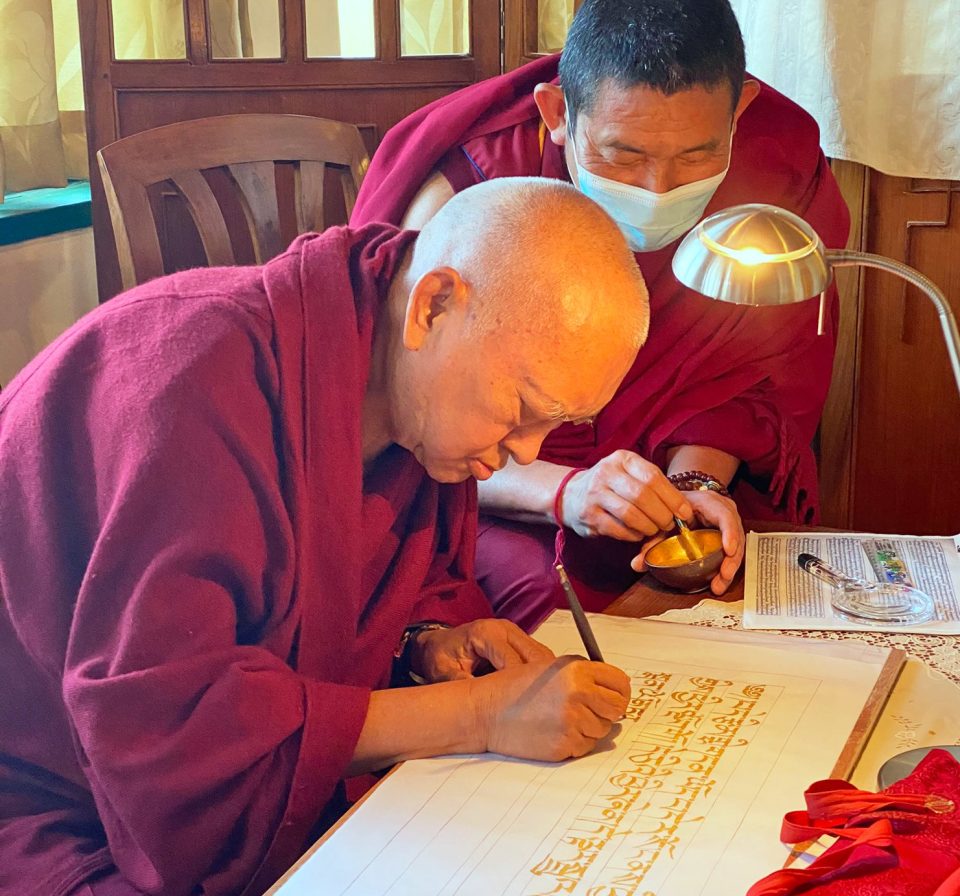
Lama Zopa Rinpoche writing out the Prajnaparamita Sutra, Kopan Monastery, Nepal, January 2022. Photo by Ven. Roger Kunsang.
During these difficult times, FPMT Spiritual Director Lama Zopa Rinpoche continues to offer profound advice and inspiration to the FPMT organization. Rinpoche’s message in the FPMT Annual Review 2021: Sharing and Preserving the Dharma in a Changing World focuses on having the correct motivation. He explains how our purpose in life is to benefit every single living being, to cherish and offer compassion to not only those who benefit us, but those who are strangers, and even those who harm us. Here is an excerpt from Rinpoche’s advice:
My Most Dear, Most Kind, Most Precious Wish-fulfilling Ones,
It is so important to continually develop compassion for sentient beings. That is the source of happiness for every single hell being, hungry ghost, animal, human being, sura being, asura being, and intermediate state being.
It is said in the sutra Perfectly Contained Holy Dharma of Arya Compassionate One (འཕག་པ་སྤྱན་རས་གཟིགས་གྱི་ཆོས་ཡང་དག་པར་སྡུད་པ་ལས):
If you wish to achieve enlightenment quickly, do not follow many Dharmas. Follow one Dharma. What is that? That is great compassion. Whoever has great compassion has all the Dharmas of the buddhas in the palm of their hands. They are achieved without effort. In short, great compassion is the root of all Dharma.
It is said in the Middle Gomrim:
Even if you are standing, even if you are going, you should meditate on great compassion toward sentient beings.
This just mentions two activities as an example, but it means all the actions—sleeping, eating, working, reading, writing, everything—should be done with compassion. This is the advice. Especially during that time, you yourself will be at peace and have happiness and other sentient beings won’t receive harm from you.
And it is said in the first verse of the Eight Verses of Thought Transformation, as you know well:
Determined to obtain the greatest possible benefit
From all sentient beings,
Who are more precious than a wish-fulfilling jewel,
I hold them most dear at all times.
This means by cherishing not only the people who help you but even strangers, who neither help or harm you, and then especially cherishing those who harm you—of course, bodhicitta is the best of great compassion—what you get from that person is enlightenment, the total cessation of every mistake, every defilement, and every subtle negative karma, and the completion of all realizations, sang gyä. That is what you get from that person who you call enemy, who abuses you, who harms you with their body, who harms you with their speech, or who harms you with their mind.
As I have mentioned many times in advice given to others, from every sentient being you receive all the past, present, and future happiness, including enlightenment, even the happiness you have in a dream. I can repeat it again here. From this obscured suffering sentient being, even the one who you call enemy, great compassion arises, wishing not only to free sentient beings from suffering but to take that responsibility upon yourself. Then, from there, bodhicitta arises. From bodhicitta, a bodhisattva arises. From a bodhisattva, a buddha arises. A buddha has two actions, one is their own heart’s action and one is within us sentient beings—that is, when we create good karma. So, all our good karma is the buddhas’ actions. Now you can see that from that buddha’s action, good karma, all the past, present, and future happiness, including enlightenment, happened.
Buddha, Dharma, and Sangha, who we take refuge in at the beginning of a practice, cause us to protect karma, liberate us from the lower realms, free us from samsara, and cause us to practice the three higher trainings. And not only that, they cause us to achieve enlightenment by freeing us from being caught in the lower nirvana for many eons. Then they cause us to generate bodhicitta, practice the six paramitas, and so forth. Even these extremely precious ones, Buddha, Dharma, and Sangha, come from every sentient being, from your friends, strangers, and even your enemies. Therefore, the numberless Buddha, Dharma, and Sangha, from whom you get all these benefits, come from this mosquito, from this tiniest insect near you on the table, on humid wood, or anywhere. So therefore, these sentient beings are the most precious, most kind, most dear, most wish-fulfilling. Even from this, it makes you think, “How dare I cause them unhappiness?” There is no way to do that. It is totally opposite: they are to be cherished the most. You can see they are the most important, precious one in your life.
So, as it says in that quotation from Middle Gomrim, all day and night your motivation should be compassion. Whatever action you are doing, you are doing it for sentient beings, dedicating it for sentient beings. …
Read Rinpoche’s complete advice in this years online annual review.
Visit FPMT.org, where you can watch more video teachings from Lama Zopa Rinpoche as part of his Teachings on Thought Transformation and find links to related videos, transcripts, MP3s, and additional practice advice.
Lama Zopa Rinpoche is the spiritual director of the Foundation for the Preservation of Mahayana Tradition (FPMT), a Tibetan Buddhist organization dedicated to the transmission of the Mahayana Buddhist tradition and values worldwide through teaching, meditation and community service.
- Home
- News/Media
- Study & Practice
- About FPMT Education Services
- Latest News
- Programs
- New to Buddhism?
- Buddhist Mind Science: Activating Your Potential
- Heart Advice for Death and Dying
- Discovering Buddhism
- Living in the Path
- Exploring Buddhism
- FPMT Basic Program
- FPMT Masters Program
- FPMT In-Depth Meditation Training
- Maitripa College
- Lotsawa Rinchen Zangpo Translator Program
- Universal Education for Compassion & Wisdom
- Online Learning Center
- Prayers & Practice Materials
- Overview of Prayers & Practices
- Full Catalogue of Prayers & Practice Materials
- Explore Popular Topics
- Benefiting Animals
- Chenrezig Resources
- Death & Dying Resources
- Lama Chopa (Guru Puja)
- Lama Zopa Rinpoche: Compendium of Precious Instructions
- Lama Zopa Rinpoche: Life Practice Advice
- Lama Zopa Rinpoche Practice Series
- Lamrim Resources
- Mantras
- Prayer Book Updates
- Purification Practices
- Sutras
- Thought Transformation (Lojong)
- Audio Materials
- Dharma Dates – Tibetan Calendar
- Translation Services
- Publishing Services
- Teachings and Advice
- Find Teachings and Advice
- Lama Zopa Rinpoche Advice Page
- Lama Zopa Rinpoche: Compendium of Precious Instructions
- Lama Zopa Rinpoche Video Teachings
- ༧སྐྱབས་རྗེ་བཟོད་པ་རིན་པོ་ཆེ་མཆོག་ནས་སྩལ་བའི་བཀའ་སློབ་བརྙན་འཕྲིན།
- Podcasts
- Lama Yeshe Wisdom Archive
- Buddhism FAQ
- Dharma for Young People
- Resources on Holy Objects
- Ways to Offer Support
- Centers
- Affiliates Area
- Teachers
- Projects
- Charitable Projects
- Make a Donation
- Applying for Grants
- News about Projects
- Other Projects within FPMT
- Support International Office
- Projects Photo Galleries
- Give Where Most Needed
- FPMT
- Shop
Translate*
*powered by Google TranslateTranslation of pages on fpmt.org is performed by Google Translate, a third party service which FPMT has no control over. The service provides automated computer translations that are only an approximation of the websites' original content. The translations should not be considered exact and only used as a rough guide.When you recognize your problem comes from your concept or your concept is the problem, you don’t blame others.







